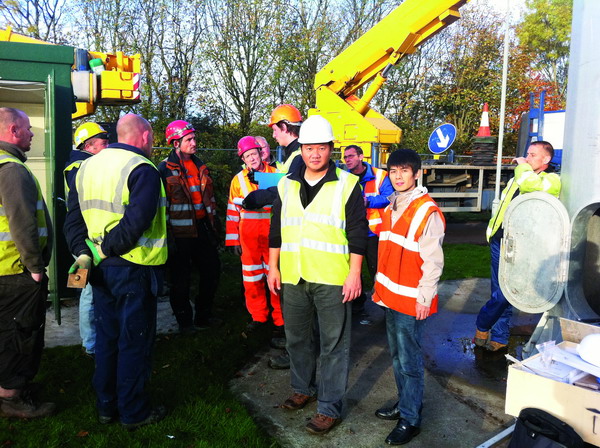Wind in the sails
Updated: 2013-03-21 14:30
By Cecily Liu and Zhang Chunyan (China Daily)
|
||||||||
|
 Joseph Deng (center), director of Ghrepower UK Ltd, at a wind turbine construction site in Wales. [Photo / China Daily] |
Ghrepower makes the difference by creating jobs amid tough economic climate
When Ghrepower, a Shanghai-based manufacturer of small and medium-size wind turbines, decided to set up a subsidiary in Swansea, Wales, in 2011 to tap into the British wind turbine market, it did not realize how much of an impact it would make on the local community.
Joseph Deng, director of Ghrepower UK Ltd, says that though the overall investment environment in Britain is satisfactory, it is the help that his team received from the Welsh government that has greatly helped the company grow.
"They have been very supportive of our development and in turn we create more jobs for the local people and bring growth to the local economy," Deng says.
The initial choice of location was made to minimize cost, he says. "Wales was not doing particularly well after the financial crisis and its government was keen to support businesses growing through favorable policy measures," he says.
One such scheme that helped the company was the Local Investment Fund scheme, which funds up to 40 percent of the capital equipment cost for small and medium-size firms in the manufacturing and manufacturing services sectors.
Another scheme of great help to Ghrepower was the GO Wales Work Placements scheme, created to help Welsh graduates find work.
Graduates participating in the scheme work at companies located in Wales for between six to 10 weeks, during which time the Welsh government contributes up to 100 pounds ($150) per week to their wages.
When the placement period ends, the employers can offer the workers long-term jobs if they wish to.
"This scheme has been very helpful for us because it creates a period of time for us to understand if the new worker fits in well with our team before we make a commitment to hire them," Deng says.
So far, three Welsh graduates have completed their placements at Ghrepower, and all three of them continued on to more permanent roles.
"Labor laws in Wales are very different from that of China. As it is much harder to fire a worker in Wales, we take great care to select the most suitable workers in the first place. And the placement period of the scheme helps us with that a lot," he says.
In Wales, workers have the right to take their employers to employment tribunals, if they feel their dismissal is unfair. The employer may be asked to give compensation payment to the dismissed workers if the workers win the case.
Differences in labor laws between China and many Western countries often surprise Chinese managers when they start to work overseas.
Despite the complexity of Welsh employment laws, Deng greatly supports the idea of employing local workers. He is currently the only Chinese within his team of eight.
"Local employees can contribute a lot to our business, they speak the local language, they know the local market very well, and they can visit our customers as they have local driving licenses," he says.

 Li Na on Time cover, makes influential 100 list
Li Na on Time cover, makes influential 100 list
 FBI releases photos of 2 Boston bombings suspects
FBI releases photos of 2 Boston bombings suspects
 World's wackiest hairstyles
World's wackiest hairstyles
 Sandstorms strike Northwest China
Sandstorms strike Northwest China
 Never-seen photos of Madonna on display
Never-seen photos of Madonna on display
 H7N9 outbreak linked to waterfowl migration
H7N9 outbreak linked to waterfowl migration
 Dozens feared dead in Texas plant blast
Dozens feared dead in Texas plant blast
 Venezuelan court rules out manual votes counting
Venezuelan court rules out manual votes counting
Most Viewed
Editor's Picks

|

|

|

|

|

|
Today's Top News
Boston bombing suspect reported cornered on boat
7.0-magnitude quake hits Sichuan
Cross-talk artist helps to spread the word
'Green' awareness levels drop in Beijing
Palace Museum spruces up
First couple on Time's list of most influential
H7N9 flu transmission studied
Trading channels 'need to broaden'
US Weekly

|

|







